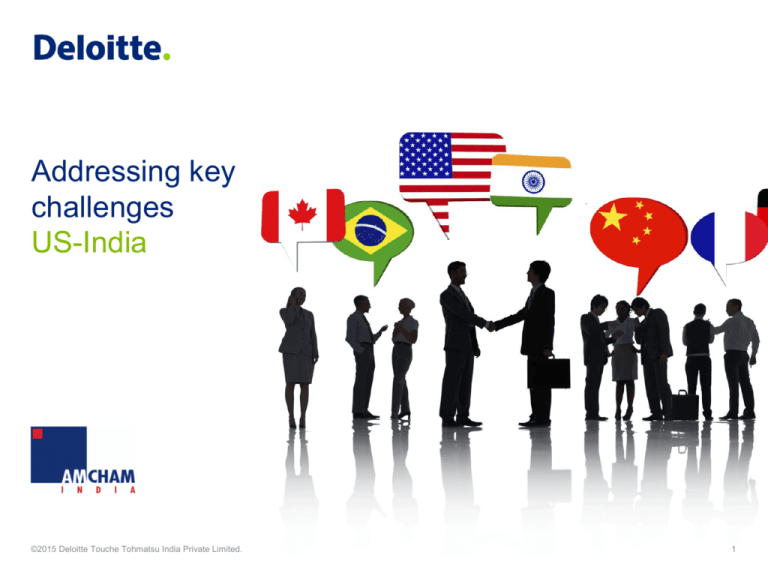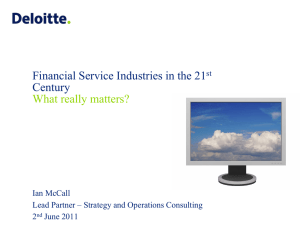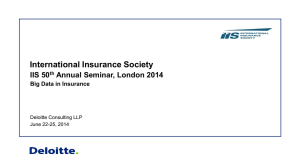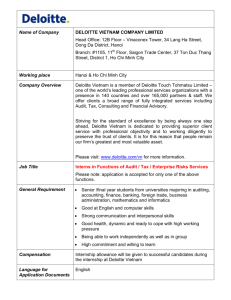Deloitte PowerPoint template
advertisement

Addressing key challenges US-India ©2015 Deloitte Touche Tohmatsu India Private Limited. 1 Indo-US Trade at a Glance ©2015 Deloitte Touche Tohmatsu India Private Limited. 2 India’s Top Trading Partners In US$ Billion Figures in US$ Bn. Rank Country Export Import Total Trade 1 China 11.94 60.41 72.35 2 USA 42.45 21.82 64.27 3 UAE 33.03 26.01 59.04 4 Saudi Arabia 11.17 28.24 39.41 5 Switzerland 1.07 22.13 23.20 6 Germany 7.54 12.79 20.33 7 Hong Kong 13.60 5.57 19.17 8 Indonesia 4.04 15.00 19.04 9 South Korea 4.60 13.53 18.13 10 Singapore 10.00 7.12 17.12 310.57 447.98 758.55 % share of total trade 10% India's Total 8% 8% 54% 5% 2% China Saudi Arabia Hong Kong Singapore 2% 2% USA Switzerland Indonesia Others 3% 3% 3% UAE Germany South Korea Data source: Ministry of Commerce and Industry Note:- Figures for FY15 ©2015 Deloitte Touche Tohmatsu India Private Limited. 3 USA’s Top Trading Partners In US$ Billion Figures in US$ Bn. Rank Country 1 Canada 312 346.1 658.1 2 China 124 466.7 590.7 3 Mexico 240.3 294.2 534.5 4 Japan 67 133.9 200.9 5 Germany 49.4 123.2 172.6 6 South Korea 44.5 69.6 114.1 7 United Kingdom 53.9 54 107.9 8 France 31.2 47 78.2 9 Brazil 42.4 30.3 72.8 11 India 21.6 45.2 66.9 1,623.3 2,345.8 3,969.1 US’s Total Export Import % share of total trade Total Trade 16% 33% 15% 2% 2% 14% 2% 3% Canada Japan United Kingdom Taiwan 5% 5% 3% China Germany France Others Mexico Korea, South India Data source: US Census Bureau Note Figures for CY2014l, India is ranked 9th in CY2015 uptil April ©2015 Deloitte Touche Tohmatsu India Private Limited. 4 India and USA- Bilateral trade % of total exports (2014-15) Figures in US$ Bn. India's trade with USA 45 20% 30 52% 15 9% 9% 0 5%5% Exports to USA Pearls, precious and semi-precious stones, imitation jewellery etc. Mineral fuels, waxes and oils etc. Pharmaceutical products Textile articles Nuclear reactors, boilers, machinery etc. Imports from USA % of total imports (2014-15) Data source: Ministry of commerce and industry 16% 45% • India enjoys favorable terms of trade with the USA, with bilateral trade led by Indian exports • Exports mainly consist of primary products such as pearls and precious stones as well as minerals and fuels • India mainly imports finished goods such as boilers, aircrafts as well as electrical machinery 14% 11% 6% 8% Pearls, precious and semi-precious stones, imitation jewellery etc. Nuclear reactors, boilers, machinery etc. Aircraft, spacecraft and parts Electrical machinery, equipment, devices and parts Mineral fuels, waxes and oils etc. Other ©2015 Deloitte Touche Tohmatsu India Private Limited. 5 India and USA – Investment flows overview FDI inflows from USA Sectoral FDI inflow from USA Figures in US$ Bn. 2.0 22% 1.5 46% 1.0 12% 0.5 12% 4% 4% Data source: Ministry of commerce and industry 2014-15 2013-14 2012-13 2011-12 2010-11 2009-10 2008-09 2007-08 0.0 Services sector Automobile industry Computer software & hardware Metallurgical industries Construction Others • At a cumulative investment of around US$ 14.1 billion (from 2000-2014), the US is the six largest investor in India (this excludes investments through Mauritius, Singapore etc.) • After a couple of lean years, investment again picked up in 2014-15, with an inflow of US$ 1.8 billion • US investment into India is predominantly focused on the services sector, with a percentage share of 22%, followed by the automobile and computer segment with a percentage share of 12% respectively ©2015 Deloitte Touche Tohmatsu India Private Limited. 6 Investment opportunities – a win-win scenario • Indian growth likely to remain around 8% for the next few years, while the US is likely to grow around 3%. • Expect India to be the 3rd largest economy after the US and China by 2030 • India ranks 9th in the world in terms of GDP at current prices, with a market size estimated to be at US$ 2.01 trillion for the year 2014 compared to US$ 1.84 trillion in 2013. • Government's effort to improve ease of doing business and relaxation in FDI norms is expected to yield results. Return on investments expected to be much higher in a fast growing market • The productivity levels in India are one-tenth of the levels in the US. Skill gap of about 347 million people in 20 high-growth sectors (infrastructure, IT, capital goods, automotives, telecom, etc) Investing in India’s Growth is an Opportunity for the US Industry ©2015 Deloitte Touche Tohmatsu India Private Limited. 7 Key Proposed Reforms ©2015 Deloitte Touche Tohmatsu India Private Limited. 8 Ease of doing business Need major improvements 160 140 120 100 80 60 40 20 0 2012 2013 India Brazil 2014 Russia China 2015 South Africa Source: World Bank India is currently placed at 142 out of 189 countries ©2015 Deloitte Touche Tohmatsu India Private Limited. 9 Major Government Programs Transforming the Economy Make In India Skill India Financial inclusion Smart Cites Major Government Initiatives Improving ease of doing business Digital India AMCHAM has been involved in giving a push to all these programs ©2015 Deloitte Touche Tohmatsu India Private Limited. 10 American Companies in India: Success Stories ©2015 Deloitte Touche Tohmatsu India Private Limited. 11 Success stories General Electric Recently GE unveiled the ‘Brilliant Factory’ in Pune, one of its most advanced facilities combining automation, industrial internet and 3D printing which caters to a diverse set of industries including aviation, oil and gas and rail The MoU for the plant was signed with the state Government in 2013 which ensured speedy implementation of this large scale project This center will also serve both domestic and export markets, working on the principle of a ‘Shared Centre of Excellence’ on process, capability and human capital aimed at driving economies of scale. The Maharashtra government is also being praised for reducing drastically the number of permissions required for setting up a factory ©2015 Deloitte Touche Tohmatsu India Private Limited. 12 Success stories DuPont Established in 1994 in India, DuPont has a significant footprint in India with a workforce of 4,000 employees spanning over 7 different locations in India Acknowledging the fact that India, with a compelling demographic advantage and availability of high-quality talent, is one of the fastest growing economies, it has been considered as a strategic market by DuPont It has also entered similar agreements with the government of Uttar Pradesh to provide technical training and other extensive services to rice growers in the state ©2015 Deloitte Touche Tohmatsu India Private Limited. DuPont initiated a Public Private Partnership (PPP) with the government of Odisha to introduce high-yielding corn hybrid seeds to more than 25,000 farmers in six districts DuPont with the support of the government has also set up solar plants on Tamil Nadu as part of its GOODWILL SOCIAL WORK CENTRE PARTNERSHIP INITIATIVE 13 Success stories United Technologies (UTC) Centrally involved in the aerospace and building systems industries, United Technologies has a presence in over 80 cities in India with 6 manufacturing facilities and 5 engineering and research centers and a workforce of 6,500 employees United Technologies intends to fully co-operate with the ‘Make in India’ program as with the help of this initiative, by localizing products instead of importing them from China , it has managed to save costs by up to 20% Boyed by the recent developments, the company plans to increase its operations in India by setting up a global training and development center in India Among its many entities, its Carrier plant in Gurgaon has been made into a production hub for SAARC nations A joint venture between United Technologies and Tata Group is now the sole supplier of 100% indigenous cabins for its S-92 helicopters Another entity of UTC, Otis, has expanding its manufacturing capabilities by doubling its capacity ©2015 Deloitte Touche Tohmatsu India Private Limited. 14 Success stories 3M Setup in 1988, 3M has operated in India for over 25 years in functioning in a diversified portfolio of industries that include manufacturing, healthcare, transportation, electronics, automotive etc. With a strength of 1,600 employees, 3M has invested around US$ 100 million over the last 15 years 3M recently decided to scale up investment in India citing India’s efforts towards the goods and tax regime and improvement in corporate tax systems as central reasons for making it an attractive destination Focusing on the co-operation coming through the ASEAN and other free trade initiatives in India, 3M is considering India as a potential export base With the Indian government driving in the ‘Make in India’ campaign, 3M is looking to participate in the campaign by helping global industrial customers to set up shop in India Along with this, the company is also willing to bet heavily on the ‘Digital India’ and ‘Smart Cities’ initiatives by planning to invest heavily in ecommerce ©2015 Deloitte Touche Tohmatsu India Private Limited. 15 Success stories Cargill Cargill initiated its operations in India in 1987 in the form of a small liaison office and now have investments in the form of edible oil refineries, animal feed mills and warehouses. Currently it is present in a numerous locations within India with an employee strength of around 2,000 people The program is aimed at training 10,000 persons in the next 12 months in skill development required for the respective sector ©2015 Deloitte Touche Tohmatsu India Private Limited. Cargill India Private Limited has been selected as part of the National Occupation Standards under the National Skill Development Council Under the ‘Fast Track Nutrition’ program, Cargill India is working in cohesion with the government of Madhya Pradesh to improve food security and nutrition in the state 16 Success stories Becton Dickinson (BD) Becton Dickinson operates through its Indian subsidiary BD India Pvt. Ltd. , set up in 1996 BD India helped form coalition of India based NGOs to work with the Indian government on TB control. The coalition is now equipping 33 government labs with TB diagnostic technology BD has set up a manufacturing plant in Haryana, for the production of medical equipment that are sold both domestically and internationally The recent MoU with National Accreditation Board for Hospital and Healthcare Providers (NABH) is a collaboration for enhancing patient and healthcare worker safety in India BD has sought approval for issuance of equity shares/redeemable preference shares for further infusion of capital of USD 20 million by its parent company In line with Indian government's commitment to fight diabetes across the country, BD signed a MoU with the Art of Living's Vyakti Vikas Kendra India in an effort to address this issue ©2015 Deloitte Touche Tohmatsu India Private Limited. 17 What these stories tell us? • Substantial increase in investment by American companies over previous years • Continued focus and interest in India: for many India is a “strategic market” • Expertise and technologies offered by American companies are directly relevant for social development initiatives like public distribution systems, financial inclusion, healthcare & education • Along with the proposed reforms, constraints that add to difficulty of doing business in India also need to be systemically reduced. • With technological advancements in all spheres, the US is a high technology partner and a prolonged partnership will lead to the Indian economy substantially gaining in the technology space • Technologies offered by US companies provide solutions for India’s vision of Digital India, Make in India, Smart Cities, Skill India etc. ©2015 Deloitte Touche Tohmatsu India Private Limited. 18 Some Key Sector Specific Issues ©2015 Deloitte Touche Tohmatsu India Private Limited. 19 Infrastructure finance Issues & solutions Underdeveloped Debt markets • Create effective market mechanism, robust trading platform, simple listing norms of corporate bonds. • Introduce long terms bonds spanning more than 30 years in line with the gestation period of the industry. Regulatory constraints • Reduce exposure norms on funds which are presently required while investing in infrastructure sector in form of debt or equity. • Move away from traditional preference to invest in public sector, government securities. User charges • Make infrastructure more amenable to commercialization and do away with regulatory, political and legal constraints in the real estate sector. • Government is not in a position to levy sufficient user charges on these services. Regulated earnings • Earnings from projects like power may be made more lucrative for private sector. • Service provider must be allowed to pass the increase in costs to the end customer which is presently not possible due to political pressures. ©2015 Deloitte Touche Tohmatsu India Private Limited. 20 Supply chain and Logistics industry Issues & solutions Unorganized and small scale • Majority of logistics service providers are small family owned consisting of a few personnel owning a couple of trucks. Develop and implement a system to consolidate and organize these multiple service providers to work in cohesion. • This will reduce the volatility in the work load and encourage economies of scale Infrastructure • Address infrastructural problems like poor road conditions, bad connectivity, inadequate air and sea port capacities • The above will go a long way in reducing high costs per transaction in Indian logistics sector and bring them at par with other developed markets Consumer demand • Needs and preferences of consumers, and customers are changing rapidly. The suppliers need to be constantly connected into these changes and digital infrastructure like increasing mobile connectivity can assist Diversified consumer base • Indian customer base is highly diverse and widely distributed • Access to remote rural areas, where growth is expected must be encouraged by giving incentives and higher returns to solution providers • Encourage adoption of supply chain strategies for developing new networks that effectively using human resources ©2015 Deloitte Touche Tohmatsu India Private Limited. 21 Biotech and Healthcare industries Issues & solutions Regulatory hurdles, Complex tax structure • Reduce regulatory hurdles at different stages right from manufacturing to market entry and various interim stages • The complex indirect tax structure and a wide array of tax rates may be streamlined with introduction of GST. Rein in aggressive tax enforcement authorities and reduce discretion • Implement internationally accepted IPR Protection Laws • Numerous regulatory bodies • • • Challenges around manufacturing Other Issues Streamline complex control structure with a wide range of regulatory bodies operating in different states at multiple levels Transparent and consistent price control policies not determined by usage data and not changed abruptly Restrictions on clinical research and trials must be lifted by instituting appropriate regulatory oversight mechanisms Medical devices must be regulated independently under a globally harmonized act based on risk based classification and not under drug & cosmetics act • Create ecosystem for manufacturing. • Price preference could be given to products manufactured in India • Government procurement procedures must become transparent and fair • Shortage of skilled professionals in this sector must be addressed • Low insurance coverage and high out of pocket spends continue to be a big challenge in healthcare. This must be addressed to ensure healthcare for all. • Establish uniform and transparent quality standards for healthcare related institutions ©2015 Deloitte Touche Tohmatsu India Private Limited. 22 Information and communication technology Issues & solutions High costs during initiation Multiple authorities • Provide incentives to service providers to offset high initial fixed costs when entering rural service areas • Provide basic infrastructure to reduce logistical risks and time taken to roll out new services. • Creep / sweep ambiguous provisions by Government prevent accurate assessment of execution and financial viability of projects • Centralize decision making authorities and prevent inefficiencies arising due to multiplicity of agencies for approval and monitoring of services • Roll out clear and simple guidelines on testing of imported equipment locally Policy challenges • Simplify the existing complex and multiple policies regarding new set ups in Telecom Sector • Modify the Preferential Market Access (PMA) laws to address concerns of global players Tax and procurement challenges • Implementation of tax reform aimed at prevention of unreasonable positions taken by India’s Income Tax Department, including on Transfer Pricing, should be encouraged • Model RFPs must be made mandatory for future procurements by Nodal Agencies • Use QCBS (Quality and Cost Based Selection) criteria for cutting-edge technology solutions ©2015 Deloitte Touche Tohmatsu India Private Limited. 23 Aviation industry Issues & solutions Easier Financing Regulatory Framework • Allow easier financing options. Permit private airport operators to issue tax free bonds • Establish ‘Essential Air Services Fund (EASF) to provide funding for no-frills airports • Possible tax holidays for encouraging aerospace related manufacturing • Cut red tape in importing aircraft engines, parts and supplies Taxation • Simplify the complex and high existing taxation structure for the aviation industry • Possible infrastructure status for the aviation industry • Declare MRO as a separate category instead of clubbing with Ground Handling (GHA) for security procedures and remove restrictions on foreign registered a/c for MRO work Infrastructure • Encourage private participants to create world class skill development centers • Help create repair and maintenance facilities in India • Encourage policies for establishing helipads at important tourist, port and mining locations ©2015 Deloitte Touche Tohmatsu India Private Limited. 24 Manufacturing sector Issues & solutions Safety testing • This mandates technology exporters to India to register their products with laboratories affiliated or certified by the Bureau of Indian Standards • Along with the above, recognize and accept credible certification held by exporters from internationally recognized laboratories. Administrative process • Streamline the tedious formalities and complex rules for clearance of imported goods • Make formalities and rules more transparent and reduce the excessive discretionary powers with regulatory officials • Reduce the number of complicated procedures for different manufacturing units Custom clearance • India has a complex custom and tariff system which leads to lack of transparency in determining the effective rates of custom tariffs and excise duties • Simplify rules for custom clearance to reduce cargo holding time for the importer Other restrictions • Imported goods are subject to various labelling requirements including the maximum retail price before they leave their place of origin. This is a logistics challenge for small orders. • A number of products have to be imported through an official authority or on the foundation of specific licenses. Although, well intended, they create various barriers for importer at different stages of the import process ©2015 Deloitte Touche Tohmatsu India Private Limited. 25 Intellectual Property Protection Issues & solutions Lack of robust policy framework • The U.S. Chamber of Commerce‘s Global Intellectual Property Center placed India last out of 25 countries included in its 2014 International IP Index • Uncertain regulatory policies pertaining to Patent and IP must be revisited and simplified • Draft IPR Policy is comprehensive but there is a need for more detailed and specific policies for addressing the needs of specific industry segments Lack of Regulatory Data Protection • Indian law must provide protection and prevent unfair commercial use of testing or other data that companies must submit to government in order to obtain marketing approval • Statutory trade secret protection must be provided against misuse and information leakage. Patent Enforcement & Regulatory Approval • Pass pending legislation that would establish fast-track IP Courts and assist in addressing disputes efficiently • Continue improvements being made in the last few years in the regulatory process of IP Offices to make them more efficient and transparent. Administrative thrust to improve the processes and policies should continue Complex market structures • Due to large, complex and segregated structure of the industrial sector in India, a large number of small players infringe on IP rights. Law of the land must contain their activities. • IP infringement seizures tend to be small and require sustained and financially draining effort to make an impact. Strict implementation must be followed. ©2015 Deloitte Touche Tohmatsu India Private Limited. 26 E- commerce Issues & solutions Insufficient usage of plastic money • A large portion of the Indian population still doesn’t own debit/credit cards due to trust deficit and complexity of perceived transaction use by the customer • There are currently 17.6 Mn. credit cards and 278 Mn. debit cards in India as compared to 331 Mn. credit cards and 3.2 Bn. debit cards in China • The financial services industry and the e-commerce industry should work in cohesion with policy makers to create greater and more enabling environment for growth FDI policy • Although 100% FDI is allowed under automatic route for business to business online trading, FDI in online business to consumer trading is restricted • The current restriction allows foreign investment only in seller based model which restricts growth in innovation as well as restricts investment in infra, and developing supply chain and logistics of the ecommerce industry • A flexible & hybrid model combining market place and inventory led model should be adopted Taxation • VAT liabilities are currently being passed on to e-commerce marketplaces in some instances, even tough they are not permitted to sell goods to end customers due to restriction under the extant FDI policy • With this profile, the responsibility to charge and deposit VAT should continue to lie with the sellers Intermediaries’ protection • The lack of clarity on the role of intermediaries in the policy framework, has led to punitive actions against e-commerce market places by various enforcement agencies • Even though e-commerce market places are not allowed to directly sell to the end customers, they are still held responsible for some of the legal compliances of these products • Similar to VAT, products are not directly sold by them, action taken against any wrong doing in this aspect, should be directed to the seller ©2015 Deloitte Touche Tohmatsu India Private Limited. 27 Major issues Common Threads Infrastructure Regulatory framework Tax structure • Lack of adequate physical and soft infrastructure affects efficiency and hence profitability • Major roadblock to the overall logistics and function of businesses • Lack of a unified economic market to generate efficiencies and economies of scale • Poor Centre State coordination for developing infra projects • Major hindrance leading to poor ranking in ease of doing business: Multiple registrations and high lead time for export and import procedures • Multiple regulatory bodies in different geographies and verticals compounds issues • Not in synch with international best practices and lacking transparency & fair play • Plethora of taxes and different tax bases creates an extremely complex structure adversely impacting business efficiency • Aggressive stand by tax authorities affecting business sentiments • Divergence between customs and tax laws on arm’s length price • Multiple disclosures on foreign payments to RBI and tax authorities ©2015 Deloitte Touche Tohmatsu India Private Limited. 28 Major Solutions Common Threads Infrastructure Regulatory framework Tax structure • Physical network of roads and rail connectivity • Digital infrastructure • Education and skill development • Women and child health • Reducing multiple registrations, • Reducing multiple regulatory approvals • Ensuring continuity and transparency in policy • Monitoring implementation of policies at ground level • Implementation of GST • Greater no. of tax courts to reduce time taken in litigation • Harmonious interpretation of tax laws e.g. customs and income tax • Certainty and continuity of tax regime • Encourage tax officers to envision industry as channels of growth ©2015 Deloitte Touche Tohmatsu India Private Limited. 29 AmCham India The American Chamber of Commerce in India is an association of American business organizations operating in India. Accredited to the Chamber of Commerce of USA, Washington DC and the Asia Pacific Council of American Chambers of Commerce (APCAC) AmCham India was established in 1992. Companies of U.S. origin make up 95 percent of the 500 strong membership, the remaining being individual and honorary members. The incumbent U.S. Ambassador to India is the Honorary President and India based CEOs of US MNCs operating in the country comprise the national board. The primary objectives of AmCham India are to: Promote activities that encourage and stimulate U.S. investment in India Support ongoing business operations of U.S. companies in India Encourage bilateral trade between the U.S. and India www.amchamindia.com Deloitte refers to one or more of Deloitte Touche Tohmatsu Limited, a UK private company limited by guarantee, and its network of member firms, each of which is a legally separate and independent entity. Please see www.deloitte.com/about for a detailed description of the legal structure of Deloitte Touche Tohmatsu Limited and its member firms. This material and the information contained herein prepared by Deloitte Touche Tohmatsu India Private Limited (DTTIPL) is intended to provide general information on a particular subject or subjects and is not an exhaustive treatment of such subject(s). None of DTTIPL, Deloitte Touche Tohmatsu Limited, its member firms, or their related entities (collectively, the “Deloitte Network”) is, by means of this material, rendering professional advice or services. The information is not intended to be relied upon as the sole basis for any decision which may affect you or your business. Before making any decision or taking any action that might affect your personal finances or business, you should consult a qualified professional adviser. No entity in the Deloitte Network shall be responsible for any loss whatsoever sustained by any person who relies on this material. ©2015 DeloitteTouche Touche Tohmatsu Private Limited. Member of Deloitte Touche Tohmatsu Limited ©2015 Deloitte Tohmatsu IndiaIndia Private Limited. 30







